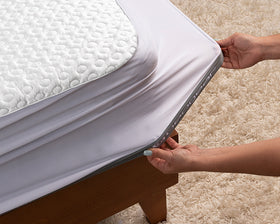888-996-9890

How Many Hours of Sleep Did You Get?
Did You Get Enough Sleep?
Adults frequently don’t sleep as much as needed. What can you do to improve your sleep habits?
People across the globe lead busy lives where they are constantly trying to get by on less and less sleep. However, even a few missed hours can have a huge effect on your mood, energy, mental acuity, and stress levels. Worse, chronic sleep loss can be detrimental to your mental and physical health. When you develop a healthy sleep routine you can more easily recover from sleep loss and improve your quality of life.
Why Is Sleep So Important?
Mental and physical health, as well as your overall waking life, is directly affected by your sleep. Productivity, emotional stability, brain and heart health, your immune system, creativity, vitality, and even your weight can be impacted by poor sleep quality.
When you’re resting, your brain remains active, managing biological support so that you can perform your best and be ready for the next day. When we aren’t well-rested, we can’t work, learn, produce, or communicate nearly as well as if we sleep soundly. In the worst cases, sleep deprivation can lead to total mental and physical collapse.
However, when we make time for sleep, quality sleep most of all, you can avoid all this and perform optimally. In fact, you’ll probably be able to get a lot more done when well-rested versus trying to stay working longer.
Truth or Fiction?
Do you really need eight hours? Can you make up sleep? Check out the answers to common sleep myths provided by Your Guide to Healthy Sleep from The National Institutes of Health.
Myth: Daytime functioning isn’t affected by getting an hour less of sleep a night.
Fact: Though it may not be quite as obvious, losing even an hour of sleep can affect your thinking and response time. It’ll even affect cardiovascular health, energy stability, and your immune system.
Myth: Changing your sleep schedule is easy for your body.
Fact: We can reset our biological clocks, but we need timed cues. Plus, we can only expect to change them by one or two hours a day at best. It can take more than seven days to adjust when you’ve gone through several time zones or if you change from day to night shift.
Myth: Sleeping extra at night will cure issues of undue daytime fatigue.
Fact: Of course quantity is important, but sleep quality is where you really need to focus. Even if you’ve slept for 8 or 9 hours, you can still feel tired if it was poor quality.
Myth: Sleeping extra on the weekends will help with getting less sleep during the week.
Fact: While you might be able to help yourself a little, this won’t completely make up for your lack of sleep. Plus, sleeping later on the weekends can affect your sleep-wake cycle, which can mean that you don’t fall asleep when you need to on Sunday and have trouble waking up on Monday.
So, How Much Sleep DO You Need?
First, understand that there is a difference between getting enough sleep to survive and getting enough sleep to thrive. According to the National Institutes of Health, average adults get fewer than seven hours a night. And though six or seven hours might sound like a lot considering how busy today’s working adults are, in reality, it can lead to chronic sleep deprivation.
Most healthy adults need between 7 and 9 hours of sleep each evening to function at their best. Children and teens will always require more. Plus, we don’t suddenly need less sleep because we’re older. That can be a problem when older adults can stay asleep that long. This is where daytime naps can help.
To truly understand if you’re getting enough sleep, consider how you feel throughout the day. Do you feel energetic and rested all day long? If so, you’re sleeping enough. Do you start to lose energy in the late afternoon? Do you need caffeine to keep you going? Bad news. You’re not getting enough rest.
Six Hours is Fine, Right? WRONG!
Researchers at the University of California- San Francisco discovered a gene that allows some individuals to function well on six hours of sleep. However, that gene is only present in 3% of people! That means 97% of us who don’t have that gene definitely need more than six hours.
Remember, operating off of six hours is possible, not optimal.

Deep Sleep & REM Seep
As we’ve mentioned, it’s not just quantity, it’s quality. Spending enough time in the different stages of sleep is crucial to feeling rested.
Every stage of sleep offers important benefits. However, deep sleep, where your body repairs itself and builds energy for the next day, and REM sleep are particularly important.
Avoiding alcohol, nicotine, and being woken during the night by noise or light will help ensure you get enough deep sleep and improving your overall sleep will increase REM sleep. You can also try sleeping an extra 30 minutes to an hour in the morning when REM sleep stages are longer.
How to Know When You’re Not Getting Enough
When you’re operating off of fewer than eight hours of sleep a night, you’re probably sleep-deprived. Yes, that’s all it takes. Worse, you might not even know that you’re sleep deprived or how it’s affecting you.
Most signs of sleep deprivation are very subtle. You aren’t just going to fall asleep mid-sentence. Additionally, if you rarely get enough sleep you might not even remember what it feels like to be truly rested and performing optimally.
Getting sleepy in a tedious meeting or when you’re perusing the web, dealing daily with the 2:30 slump, or falling asleep to the TV after dinner might be totally “normal” to you, but they’re really not. You do this because you’re sleep-deprived.
You may be sleep deprived if you…
- Can only wake up on time with an alarm
- Rely heavily on several snoozes
- Struggle to get out of bed each morning
- Always get tired in the afternoon
- Have trouble staying awake during meetings, car rides, or warm rooms
- Become sleepy when driving or after big meals
- Nap during the day very often
- Can’t make it through a movie or TV show without falling asleep
- Depend on weekends for sleeping in
- Take five or fewer minutes to fall asleep
How Does This Affect You?
As you likely now know, not getting enough sleep can affect you in a variety of ways. If it becomes a chronic issue, lack of sleep can impair your judgment, coordination, and reaction times. In fact, it can be just as bad as if you were drunk.
The effects include:
- Tiredness, lethargy, and being unmotivated
- Poor mood and easy irritability
- Increased chance of depression
- Reduced sexual impulse can lead to relationship problems
- Issues with learning, concentration, and memory
- Minimized creativity and impaired problem-solving skills
- Trouble making decisions
- Problems managing stress and emotions
- Early skin aging
- Vulnerable immune system resulting in frequent colds, infections, etc.
- Weight gain
- Poor motor skills leading to an increased chance of accidents
- Hallucinations or delirium
- Heightened prospect of severe health concerns like stroke, diabetes, high blood pressure, heart disease, Alzheimer’s disease, and certain cancers
Sleep Tips

If you’re looking to address a specific concern, or just want to be more productive, mentally keen, and emotionally stable throughout your day, you can try the following tips to see help you rest easier.
- Make sure there isn’t a medical condition playing a part. Poor sleep could be the result of a physical or mental health issue or a side-effect of medication.
- Establish and stick to a sleep routine. Go to bed and wake up at the same time every day, yes this includes weekends. Also avoid screens, work, and stressful conversations late at night. Wind down and calm your mind with a bath, reading, or practicing a relaxation technique.
- Exercise regularly. Consistent exercise can help with sleep problems and help you to expend energy so that you fall asleep quicker. Try to be active for 30 minutes or more on most days, but avoid doing this too close to bedtime.
- Eat and drink smart. Caffeine, alcohol, and sugary foods affect your sleep. So can eating heavy meals or drinking a lot too close to bedtime.
- Reduce your stress. If stress is keeping you awake, try different techniques to help you relax and learn how to manage stress during the day in a productive manner.
- Create the perfect sleep environment by keeping your bedroom dark, quiet, and cool. Human bodies need darkness to produce sleep hormones. Additionally, it is important that you use your bedroom for sleeping and sex. Don’t work or watch TV in there.
- If you wake up in the middle of the night feeling anxious about something, quickly scribble it down so that you can deal with it in the morning. If this doesn’t work or you’re often anxious and panicky, you may need to see a mental health professional.
Sleep is crucial to performing our best and staying healthy. It matters. It is just as important as making time for work. Put your sleep health high up on your list of priorities and make sure you’re getting the sleep you need. Your body and mind will thank you.





